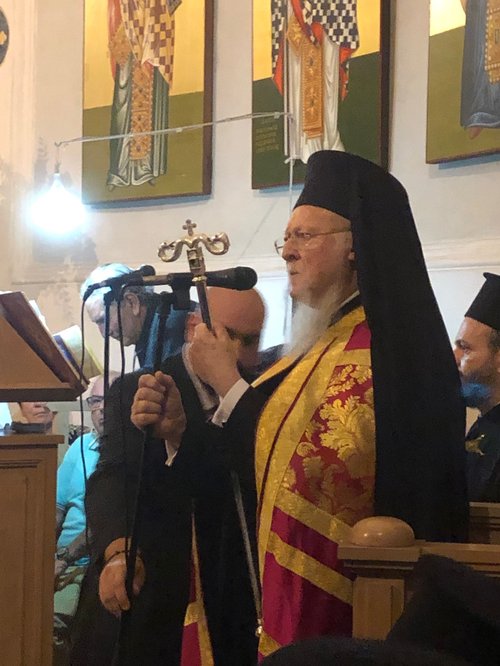The importance of mystery in faith
01 October 2019
01 October 2019
 I haven't really been to that many pop concerts. Those I did attend involved squeezing into the back of a packed auditorium - stretching my neck to get a glimpse of the musicians. I recently had a different but similar experience. In September the Ecumenical Patriarch of Constantinople, Bartholomew I, visited Rome. While the Orthodox tradition has no central doctrinal or governmental authority analogous to the Western Papacy the Patriarch is regarded as the spiritual father of 300 million Eastern Orthodox Christians. It felt like all of them had turned up to the Greek Orthodox Church in Rome, the volume of people crammed into the cathedral was remarkable.
I haven't really been to that many pop concerts. Those I did attend involved squeezing into the back of a packed auditorium - stretching my neck to get a glimpse of the musicians. I recently had a different but similar experience. In September the Ecumenical Patriarch of Constantinople, Bartholomew I, visited Rome. While the Orthodox tradition has no central doctrinal or governmental authority analogous to the Western Papacy the Patriarch is regarded as the spiritual father of 300 million Eastern Orthodox Christians. It felt like all of them had turned up to the Greek Orthodox Church in Rome, the volume of people crammed into the cathedral was remarkable.
The service was held in Saint Theodore's, a church gifted to the Orthodox by Pope John Paul II in 2004.Invited to represent the Methodist Church in Italy, and the Methodist Ecumenical Office in Rome, I arrived in very good time. Sadly, I couldn't for the life of me get into the building. It seemed as though the whole city had turned out for the occasion. Fortunately, a priest noticed me and, after wading through the crowds, we got relatively near the iconostasis – the wall of icons separating the nave from the sanctuary with icons.
The service was enchanting, the singing heavenly. Although I couldn't see into the heart of the sanctuary, I could feel it. Like the petals of a rose, the images enveloping this sacred space communicated with my heart. The vespers, sung in a language I didn't understand, liberated my mind, enabling a sense of the majesty of God.
As I stood, enraptured by the scene before me, I couldn’t help noticing how different it all was from Christianity in the West (where everything must be clarified, defined and expounded). In the midst of all this beauty I sensed that if full organic unity between the churches is to be realised, the place of mystery in theology may need greater emphasis. Unity was an important theme for the Patriarch throughout his visit to Rome [my translation of his italian address below].
“We must respect and recognize each other [for this] is the fundamental obligation of every Church, be it Orthodox, Roman Catholic or any other Protestant denomination. [However] the goal of ecumenical dialogue, cannot be reduced to the prospect of a union of the Christian Churches alone. The purpose is to facilitate the salvation of the world in Jesus Christ. The search for Christian unity is actually the search for the unity of humankind...In a cultural context, marked by multiple forms of racism , every initiative aimed at uniting the peoples of the earth in the Spirit of sincere reconciliation [is] a contribution to a better future for humanity.”
The whole experience was deeply moving and at the end people flocked towards the Patriarch. I willingly immersed myself in this tide of Orthodoxy and had brief opportunity to greet His Holiness. All those who did (and they were many) were given an icon of Saint Theodore (pictured below), a saint in both the Catholic and Orthodox traditions. I will treasure it, and hope that it will ever remind me to embrace the role of mystery in faith.
Daniel Pratt Morris-Chapman
Interim Director, MEOR